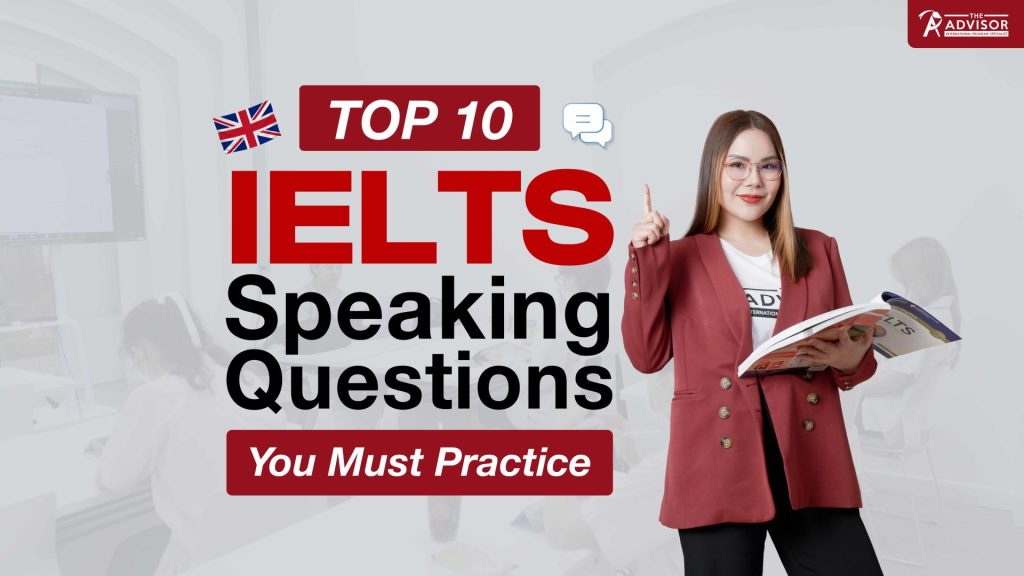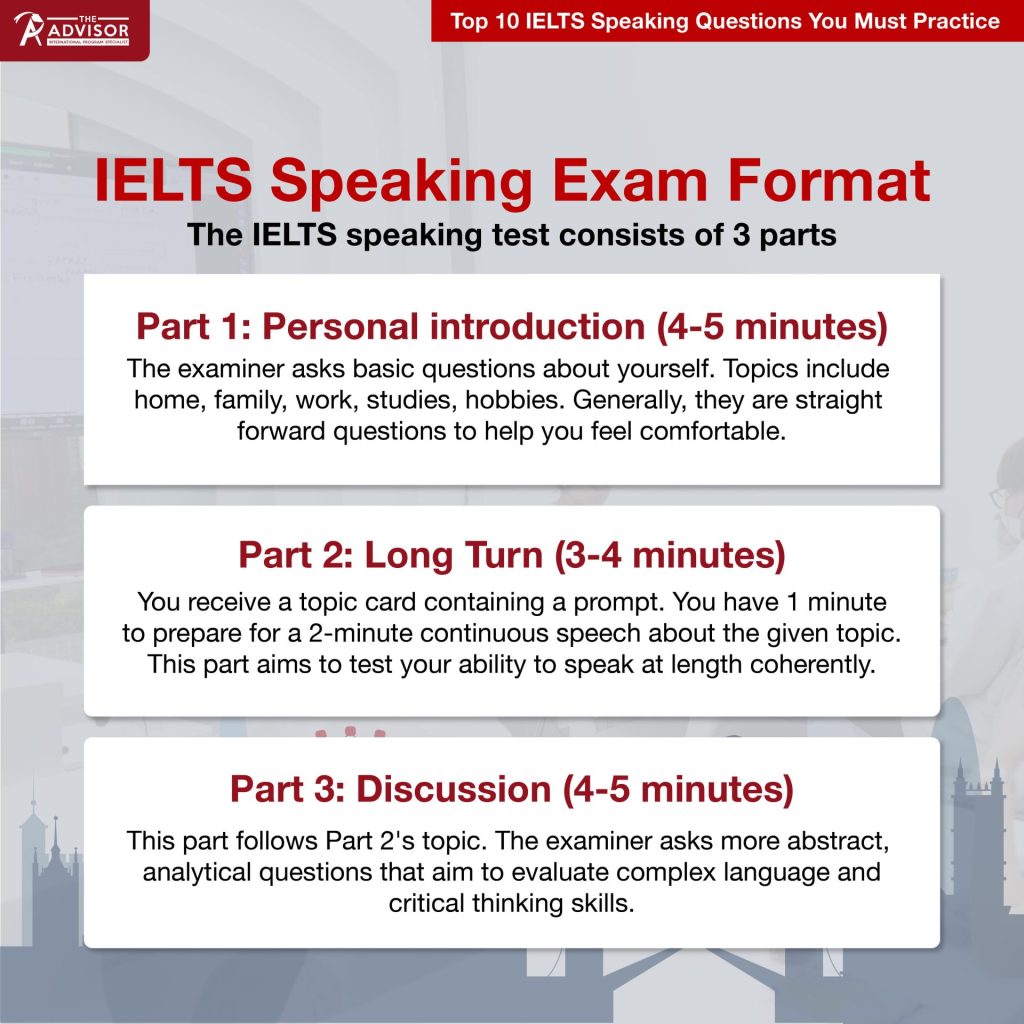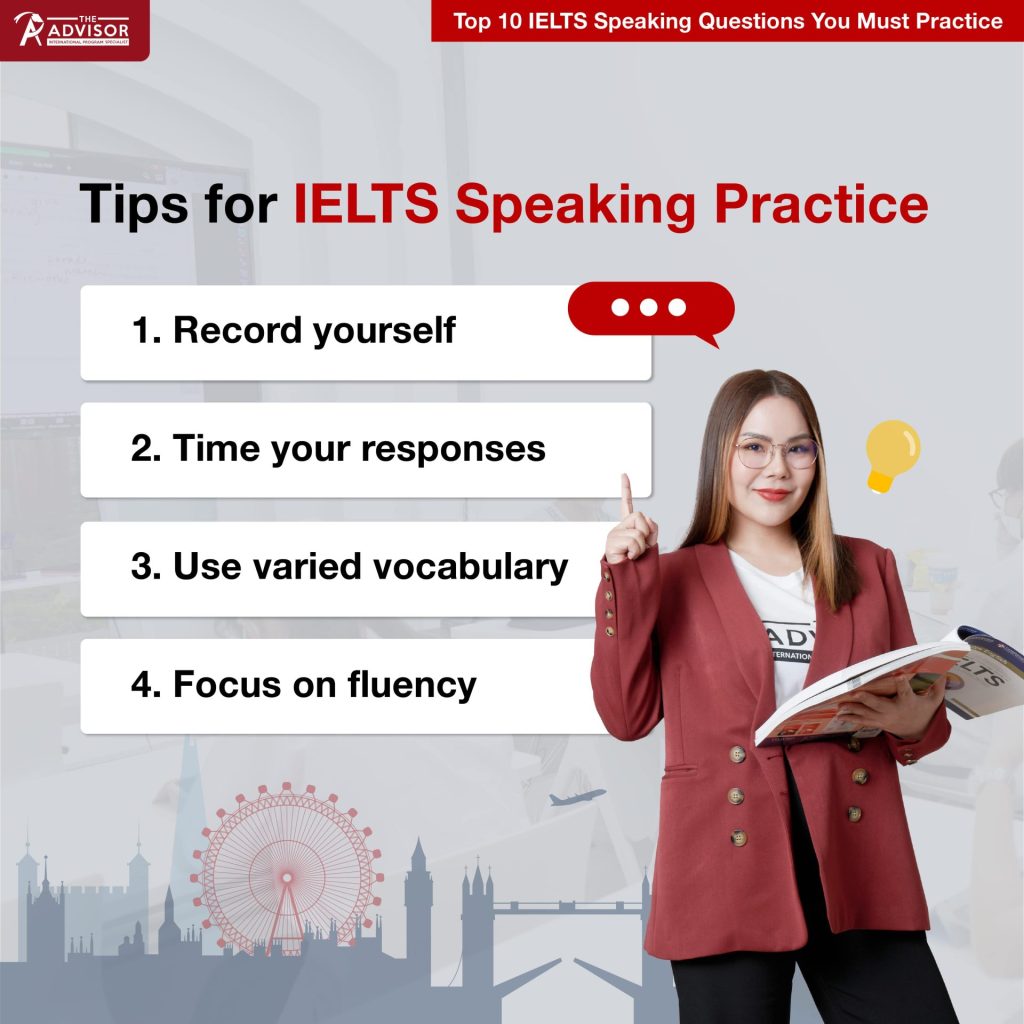Top 10 IELTS Speaking Questions You Must Practice

Preparing for the IELTS speaking test is demanding, but practicing the right questions can make a big difference. In this blog, we have compiled the top 10 IELTS speaking questions you must practice, covering Parts 1, 2, and 3 of the test. These questions will help you strengthen your vocabulary, structure your answers, and demonstrate your English skills effectively. Let’s dive in and start practicing for success!
IELTS Speaking Exam Format

The IELTS speaking test consists of three parts:
- Part 1: Personal introduction (4-5 minutes)
The examiner asks basic questions about yourself. Topics include home, family, work, studies, hobbies. Generally, they are straightforward questions to help you feel comfortable.
- Part 2: Long Turn (3-4 minutes)
You receive a topic card containing a prompt. You have 1 minute to prepare for a 2-minute continuous speech about the given topic. This part aims to test your ability to speak at length coherently.
- Part 3: Discussion (4-5 minutes)
This part follows Part 2’s topic. The examiner asks more abstract, analytical questions that aim to evaluate complex language and critical thinking skills.
Top 10 Common IELTS Speaking Topics
- Tell me about yourself (Part 1)
This question is one of the most frequently asked in Part 1 of the IELTS speaking test. While it seems straightforward, it requires a strategic approach including:
- Start with a brief introduction about your background
- Include where you’re from
- Mention your current occupation or educational status
- Add an interesting personal detail that could spark conversation
- Describe your hometown (Part 1)
Hometown questions test your ability to provide detailed descriptions. Be prepared to describe your hometown, including its location, size, notable landmarks, and what you like or dislike about it.
- Discuss the location and its geographical features
- Explain what makes your hometown special
- Share personal memories or connections
- Describe changes you’ve observed over time
- Talk about your family (Part 1)
Family questions allow you to demonstrate vocabulary and personal narrative skills including:
- Introduce your family members
- Describe their occupations
- Share a brief story about a family memory
- Discuss family dynamics or traditions
- Describe a memorable event in your life (Part 2)
Moving on to Part 2 of the IELTS speaking test, this question often appears in Part 2 and you should prepare to narrate a significant event from your past. Also, you should be able to explain why it was memorable and how it impacted you:
- What was the specific event
- When and where it occurred
- Explain memorable experiences
- The broader significance of the moment
- Describe a recent travel experience (Part 2)
Travel topics test your narrative and descriptive abilities. Practice organizing your ideas logically. Start with where you went, why you went, and what you did.
- Choose an interesting destination
- Describe when and why you traveled
- Explain memorable experiences
- Discuss what you learned from the trip
- Describe a person you admire (Part 2)
You should organize your answer with a clear structure—introduce the person, explain why you admire them, and give specific examples of their qualities or achievements. Practice using positive adjectives to describe their personality, actions, and impact, such as “inspiring,” “dedicated,” or “courageous.”
- Choose a compelling person (family member, historical figure, celebrity)
- Explain why you admire them
- Provide specific examples of their achievements
- Discuss the impact they have on your life or others
- Technology and society (Part 3)
Questions related to technology and its impact on society are common in the IELTS speaking test. Practice discussing both the positive and negative aspects of technology and provide examples to support your arguments.
Here are potential questions:
- How has technology changed the way people communicate?
- Does technology strengthen or weaken relationships between people?
- How has technology influenced education?
- What technological advancements do you think will happen in the next 10 years?
- Environmental issues (Part 3)
The environment is another frequently discussed topic, including pollution, climate change, environmental sustainability, and the role of governments and individuals in protecting the environment. You should familiarize yourself with related vocabulary, express opinions, and provide examples or solutions.
Here are potential questions:
- What do you think are the biggest environmental problems in your country?
- How can countries work together to combat climate change?
- Do you think economic growth and environmental protection can coexist?
- Do you think individuals or governments are more responsible for protecting the environment?
- Education (Part 3)
Education is a globally relevant topic and the questions are designed for test-takers from diverse backgrounds. Prepare to provide detailed answers, explain your opinions and giving examples. If asked about differences in education systems or learning styles, provide clear comparisons.
Here are potential questions:
- How does education influence a person’s future?
- What are the main differences between traditional and modern teaching methods?
- Should governments invest more in primary or higher education? Why?
- How important is lifelong learning in today’s world?
- Culture (Part 3)
The topic of cultural differences is relatively common in the IELTS Speaking Part 3 because it encourages test-takers to discuss global and social issues with critical thinking. Practice how to address the different cultural aspects, such as traditions, communication styles, or festivals. Discuss whether we should embrace or minimize these differences.
Here are potential questions:
- What are the benefits of learning about other cultures?
- How do traditions in your country differ from those in other countries?
- Do you think globalization is making cultures more similar or more distinct? Why?
- Do you think people should adapt to the local culture when they visit another country?
Tips for IELTS Speaking Practice

- Record yourself: Use voice recording to analyze your speaking pace, clarity, and coherence.
- Time your responses: Practice speaking within the allocated time for each section.
- Use varied vocabulary: Avoid repetition and demonstrate lexical range.
- Focus on fluency: Prioritize smooth communication over perfect grammar.
Common Mistakes in IELTS Speaking
Overthink your introduction: In Part 1, you should give straightforward, natural answers about yourself and avoid a rehearsed speech.
Give overly brief responses: Examiners want to hear you communicate, so aim to elaborate on your answers. If asked about your hometown, don’t just say “It’s nice”, instead, describe what makes it special, share a memory, or explain why you appreciate it.
Speaking too quickly or monotonously: The test assesses your ability to communicate clearly, so focus on pronunciation, intonation, and a steady pace. Rushing through answers can make you sound nervous and less intelligible.
Vocabulary misuse: While it’s great to use advanced words, forcing complex terms that you’re not completely comfortable with can backfire. It’s better to use simpler language correctly than to misuse advanced vocabulary.
Don’t panic about making minor grammatical mistakes: Examiners are more interested in your overall communication skills than perfect grammar. Stay confident, speak naturally, and let your English shine!
Conclusion
To sum up, success in the IELTS Speaking test isn’t about memorizing answers. It’s about developing confidence and communication skills. To achieve your desired band score, you must practice these topics regularly, record yourself, and seek feedback from teachers or tutors. At The Advisor Academy, our IELTS specialists can help you boost the score with 1-on-1 speaking practice. Contact us for a free consultation at @theadvisor